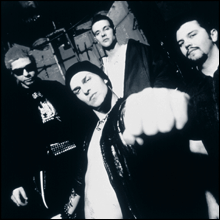![[Sidebar]](/standard/image/sidebar.gif)
![[Music Reviews]](/standard/image/headers/music_reviews_header.gif)
| clubs by night | club directory | bands in town | concerts | hot links | reviews & features |
Cover stories
A tribute to the Clash
by Matt Ashare
Rancid
I still remember when I stumbled across an LP of various artists performing songs by Neil Young a decade ago and thought to myself, "Wow, that's a pretty cool idea." These days, of course, tribute albums are a common, even mundane part of the endless flood of CDs that arrive in stores every Monday at midnight, week after week, on big labels and small. I'm not sure why major labels continue to devote time and money to the tribute album, because for all the publicity generated by compilations dedicated to new interpretations of the work of, say, a John Lennon, in the end the CDs never sell all that well. Old John Lennon fans are probably more interested in hearing real John Lennon outtakes than new recordings of his old songs by Cheap Trick and a bunch of bands they've never heard of. And even if you are a Red Hot Chili Peppers fan, you may not want to drop 15 bucks for only one Chili Peppers tune and a bunch of other tracks by bands you don't care about. My guess is that the tribute album has survived as something of a creative indulgence for fortunate A&R types whose jobs otherwise consist of chasing new bands around with checkbooks in hand, keeping their fingers crossed, and, from time to time, getting fired and rehired.Whatever the motive, I still look forward to tribute discs, mostly out of an abiding fondness for cover tunes, a pop novelty unfairly discredited by hordes of GB (general business) bands who specialize in rote versions of Top 40 hits and, of course, the Grateful Dead. Back when I was playing in bands, it was considered a point of pride not to do any covers -- until we heard the Replacements' version of Kiss's "Black Diamond" on Let It Be and saw R.E.M. open a show with the Velvet Underground's "Femme Fatale." Suddenly, reinterpreting a classic took on a whole new meaning: covers became an integral part of a band's musical identity, and it was perfectly acceptable to judge an outfit by their choices. Those choices are necessarily narrowed down to material by a single artist on a tribute disc -- which isn't as revealing as hearing, say, a band like Hole pull a Duran Duran tune out of nowhere on stage. But you can still judge a band by the quality of their cover.
The new Burning London: The Clash Tribute (Epic; in stores Tuesday, March 16) offers a dozen or so contemporary artists the chance to do what they will with the work of a now ancient punk band whose songs have never been as popular to cover as the Ramones or even the Sex Pistols. That's partly because, with a few notable exceptions ("Train in Vain," "Should I Stay or Should I Go"), the Clash wrote songs that had some universal resonance as anthems but were more often than not self-referential ("Clash City Rockers," "This Is Radio Clash"). Their best tunes were tied to a specific time, place, and situation, whether it was visiting an unwelcoming Jamaica as naive young reggae fans ("Safe European Home") or simply squabbling with their record label ("Complete Control"). Their songs are so Clash-identified that they don't leave much room for outside artistic interpretation.
That's not a problem for Rancid, a band custom-made to play Clash covers. They dig their combat boots into the rebel rock of "Cheat" as if they'd been born auditioning for the part of the Clash in Calling London: The Punk Years, with Tim Armstrong singing as if he had a copy of Black Market Clash caught in his throat. The Mighty Mighty Bosstones handle the ska-flavored "Rudy Can't Fail" with appropriate care; 311 put a Southern California spin on the lyrics to "White Man in Hammersmith Palais" (and prove that they've been a good band in search of a good song all along); and some outfit called the Urge do a respectable job with "This Is Radio Clash," though it might have been cool to hear what Fatboy Slim would do with what is arguably the first ever big-beat tune. Third Eye Blind had the clout to score an easy hit -- "Train in Vain" -- but they sound as if they could care less. Same goes for No Doubt, whose stiff cover of "Hateful" sounds as if it had been recorded to fulfill some sort of contractual obligation. Silverchair seem, as usual, like a band trying way too hard to sound angry on their roughed-up version of "London's Burning."
Burning London becomes more interesting when the Afghan Whigs try to turn "Lost in the Supermarket" into a sexy soul tune, Cracker reinvent "White Riot" as a hillbilly country number, the Indigo Girls get folky with "Clampdown," Ice Cube and Mack 10 rap over the riff from "Should I Stay or Should I Go," and Moby helps Heather Nova create an ethereal Sinéad O'Connor-style hymn out of "Straight to Hell." Not all of it works -- "Clampdown" sounds more sanctimonious than cautionary as a campfire sing-along. But in at least a couple of cases I did find myself thinking, "Wow, that's a pretty cool idea."
| home page | what's new | search | about the phoenix | feedback |
Copyright © 1999 The Phoenix Media/Communications Group. All rights reserved.
